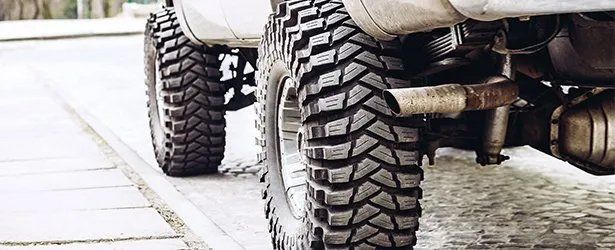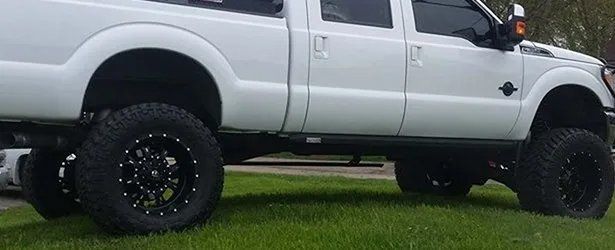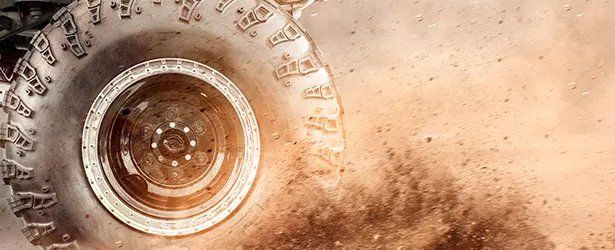If You Can Draw It on a Napkin...
We Can Make It
Serving Illinois and Southeastern Wisconsin
Tire and Wheel Sales and Installation
40+ Years of Experience
Lifetime Warranty on All Work
Free Inspections and Estimates
Hours:
We're Your Trusted Dealer for Tires and Wheels
It can be a difficult task to find oversized tires because not every shop sells them. Fortunately, you can find tires of various sizes for cars, trucks, and SUVs when you visit CNC Off Road.
- We sell products from leading brands in the country, such as BFGoodrich, Nitto, and Hankook
- We sell OTR tires, passenger truck tires, and light truck tires
- Visit us today for low-profile tire installations, tire rotations, and TPMS repairs
Before you start shopping for a new set of wheels, read our wheel buying guide below, and consider the advantages and disadvantages of different wheel materials. If you have any questions, call us at (262) 945-7165 or use our handy online form and we can help you.

Check Out CNC Off Road's Wheel Buying Guide
- Alloy wheels are light wheels with advanced performance features. Alloy wheels increase cornering and improve the steering precision to decrease the road feedback for better braking response.
- Steel wheels are heavier and help vehicles with a lower center of gravity. Steel wheels are perfect for harsh road conditions in the snow or off-road over rugged terrain. Unfortunately, these wheels lack other performance capabilities because of the added weight.
- Chrome wheels have an aesthetically pleasing finish when compared to alloy and steel wheels. If you're concerned about the visual appeal of your vehicle, chrome wheels are your solution. They require regular attention and cleaning to maintain their look.

Wheels and Rims: The Manufacturing Process
- Cast wheels: Aluminum wheels are manufactured through a process of pouring molten aluminum into a mold. The shape of the wheel is formed through a process of gravity or pressure casting.
- Machined wheels: The machining process combines casting, heating, spinning, and precise pressurization to fill a mold with molten aluminum and shape the wheel.
- Forged wheels: The forging process takes a solid piece of aluminum and molds the wheel through high heat and extreme pressure. The result is a light, dense, and strong wheel.
The right set of wheels depends on vehicle characteristics and desired ride quality. When choosing wheels for your car, truck, or SUV, consider the following variables.
- Size: Various wheel sizes and weights hold different performance features. If you intend to upgrade your current wheel size, consider the maximum wheel size allowance on your vehicle.
- Weight: Wheel weight has a direct effect on vehicle performance. Heavier wheels increase braking distance and reduce handling, whereas lighter wheels will improve maneuverability and braking performance.
- Terrain: Where you drive most often has an effect on the longevity of your wheels. Choose wheels based on your terrain.
Everybody has different needs when it comes to buying wheels. Our staff includes wheel and rim experts who can help you choose the right kind of wheel. Talk to us today to learn more about wheels.

Tips to Help You Stay on Top of Tire Maintenance
- Check tire pressure to ensure proper inflation. If your tires are not inflated to the required capacity, it can lead to excess heat, uneven tire wear, and decreased braking and handling capabilities, which may cause structural failures like blowouts and tread separation. When tires are inflated to the optimum level, they will maximize tread life, improve handling, and increase fuel efficiency and overall driver safety.
- Follow routine and regular tire rotation schedules. Rotation patterns for your vehicle can be found in your owner’s manual. Routine tire rotations enhance front-to-rear and side-to-side tire wear. Remember: tire rotation will not prevent or circumvent wear issues caused by worn mechanical components.
- Balance tires whenever necessary. Unbalanced tires may be detected in bumps that become more noticeable at higher speeds. Balancing tires is necessary during initial installation and during a remount.
- Install new tires in sets or pairs. The addition of just one new tire to the rotation cycle can cause instability and create handling issues while driving. When new tires are needed, ensure that you install them in pairs. Two new tires should be installed on the rear of a vehicle, and the partially worn tires should be moved to the front of the vehicle.
- When the time comes to store your tires for next season, consider a dark place away from direct sunlight and with low humidity. Tires should be stored away from solvents, grease, oil, or any ozone-producing electrical equipment because they have deteriorating effects on tires.
- Be careful and avoid abnormal tire wear or damage to your tires. Watch for signs of punctures, embedded objects, cracks, and bulges.
- Always keep a spare tire, and make sure it’s properly inflated and ready for use. You never know when you’re going to need it.
These tips are essential when you service or repair your tires. The Rubber Manufacturer's Association (RMA) recommends that you take five minutes each month to check your tires. Other mechanical issues may contribute to uneven tire wear and need correction in order to maximize tire life and vehicle performance.
Over 1,000 Brands
of automotive products available
Call for free diagnostics, inspections, and estimates
(262) 945-7165
Great work, excellent service and patient staff. Had gears and a locker installed, whisper quiet, and 6,000 trouble-free miles so far. Staff even stayed late on a holiday weekend so I could pick up my axle. If you're looking for professional work, this is your place.
- Adam Kesselman
Send Us a Message
Contact Form
We appreciate you contacting us. One of our colleagues will get back in touch with you soon!
Have a great day!
Oops, there was an error sending your message.
Please try again later.
Business Hours
- Mon - Fri
- -
- Saturday
- -
- Sunday
- Closed


Share On: